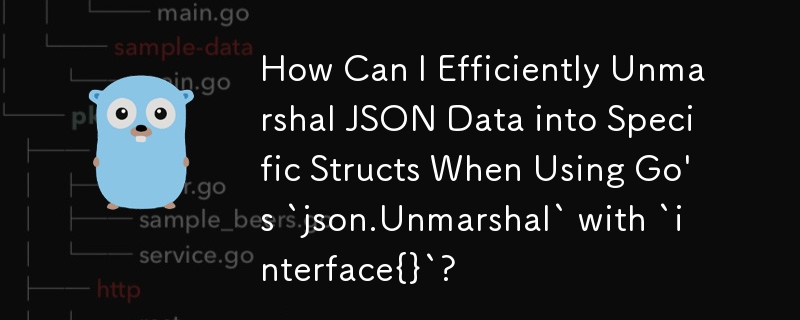当使用 Go 的 `json.Unmarshal` 和 `interface{}` 时,如何有效地将 JSON 数据解组到特定的结构中?

解组为 Interface{} 和类型断言
问题陈述
使用 Go 的 json.Unmarshal 解码字符串时从消息系统中发现结果是map[string]interface{}而不是预期的结构类型(Somthing1 或 Somthing2),使得类型断言不可能。
根本原因
json.Unmarshal 函数,当解组到接口{}时,默认值已知类型,如 []interface{} 和 map[string]interface{}。在给定的代码中,接口变量输入接收表示未编组的 JSON 数据的 map[string]interface{},但 switch 语句尝试直接将其断言为 Somthing1 或 Somthing2。
解决方案
由于 JSON 本身并未解组到所需的结构中,因此有两个选项可以解决此问题问题:
1。从通用映射中检查和转换:
一种方法是检查 map[string]interface{} 并手动将数据解包到适当的结构类型中。但是,这需要仔细处理潜在错误并手动分配值。
2.使用自定义 JSON 解组器:
更简洁的解决方案是创建自定义 JSON 解组器来处理解组过程。此自定义解组器可以根据 JSON 数据识别正确的结构类型并相应地对其进行解组。以下是此类解组器的示例:
type Unpacker struct {
Data interface{}
}
func (u *Unpacker) UnmarshalJSON(b []byte) error {
smth1 := &Something1{}
err := json.Unmarshal(b, smth1)
// no error, but we also need to make sure we unmarshaled something
if err == nil && smth1.Thing != "" {
u.Data = smth1
return nil
}
// abort if we have an error other than the wrong type
if _, ok := err.(*json.UnmarshalTypeError); err != nil && !ok {
return err
}
smth2 := &Something2{}
err = json.Unmarshal(b, smth2)
if err != nil {
return err
}
u.Data = smth2
return nil
}通过将此自定义解组器的实例传递给 json.Unmarshal,生成的 Data 字段将包含正确结构类型的解组数据,从而允许无缝类型断言.
以上是当使用 Go 的 `json.Unmarshal` 和 `interface{}` 时,如何有效地将 JSON 数据解组到特定的结构中?的详细内容。更多信息请关注PHP中文网其他相关文章!

热AI工具

Undresser.AI Undress
人工智能驱动的应用程序,用于创建逼真的裸体照片

AI Clothes Remover
用于从照片中去除衣服的在线人工智能工具。

Undress AI Tool
免费脱衣服图片

Clothoff.io
AI脱衣机

Video Face Swap
使用我们完全免费的人工智能换脸工具轻松在任何视频中换脸!

热门文章

热工具

记事本++7.3.1
好用且免费的代码编辑器

SublimeText3汉化版
中文版,非常好用

禅工作室 13.0.1
功能强大的PHP集成开发环境

Dreamweaver CS6
视觉化网页开发工具

SublimeText3 Mac版
神级代码编辑软件(SublimeText3)
 Debian OpenSSL有哪些漏洞
Apr 02, 2025 am 07:30 AM
Debian OpenSSL有哪些漏洞
Apr 02, 2025 am 07:30 AM
OpenSSL,作为广泛应用于安全通信的开源库,提供了加密算法、密钥和证书管理等功能。然而,其历史版本中存在一些已知安全漏洞,其中一些危害极大。本文将重点介绍Debian系统中OpenSSL的常见漏洞及应对措施。DebianOpenSSL已知漏洞:OpenSSL曾出现过多个严重漏洞,例如:心脏出血漏洞(CVE-2014-0160):该漏洞影响OpenSSL1.0.1至1.0.1f以及1.0.2至1.0.2beta版本。攻击者可利用此漏洞未经授权读取服务器上的敏感信息,包括加密密钥等。
 从前端转型后端开发,学习Java还是Golang更有前景?
Apr 02, 2025 am 09:12 AM
从前端转型后端开发,学习Java还是Golang更有前景?
Apr 02, 2025 am 09:12 AM
后端学习路径:从前端转型到后端的探索之旅作为一名从前端开发转型的后端初学者,你已经有了nodejs的基础,...
 Go语言中用于浮点数运算的库有哪些?
Apr 02, 2025 pm 02:06 PM
Go语言中用于浮点数运算的库有哪些?
Apr 02, 2025 pm 02:06 PM
Go语言中用于浮点数运算的库介绍在Go语言(也称为Golang)中,进行浮点数的加减乘除运算时,如何确保精度是�...
 Go的爬虫Colly中Queue线程的问题是什么?
Apr 02, 2025 pm 02:09 PM
Go的爬虫Colly中Queue线程的问题是什么?
Apr 02, 2025 pm 02:09 PM
Go爬虫Colly中的Queue线程问题探讨在使用Go语言的Colly爬虫库时,开发者常常会遇到关于线程和请求队列的问题。�...
 Beego ORM中如何指定模型关联的数据库?
Apr 02, 2025 pm 03:54 PM
Beego ORM中如何指定模型关联的数据库?
Apr 02, 2025 pm 03:54 PM
在BeegoORM框架下,如何指定模型关联的数据库?许多Beego项目需要同时操作多个数据库。当使用Beego...
 在 Go 语言中,为什么使用 Println 和 string() 函数打印字符串会出现不同的效果?
Apr 02, 2025 pm 02:03 PM
在 Go 语言中,为什么使用 Println 和 string() 函数打印字符串会出现不同的效果?
Apr 02, 2025 pm 02:03 PM
Go语言中字符串打印的区别:使用Println与string()函数的效果差异在Go...
 在Go语言中使用Redis Stream实现消息队列时,如何解决user_id类型转换问题?
Apr 02, 2025 pm 04:54 PM
在Go语言中使用Redis Stream实现消息队列时,如何解决user_id类型转换问题?
Apr 02, 2025 pm 04:54 PM
Go语言中使用RedisStream实现消息队列时类型转换问题在使用Go语言与Redis...
 GoLand中自定义结构体标签不显示怎么办?
Apr 02, 2025 pm 05:09 PM
GoLand中自定义结构体标签不显示怎么办?
Apr 02, 2025 pm 05:09 PM
GoLand中自定义结构体标签不显示怎么办?在使用GoLand进行Go语言开发时,很多开发者会遇到自定义结构体标签在�...






